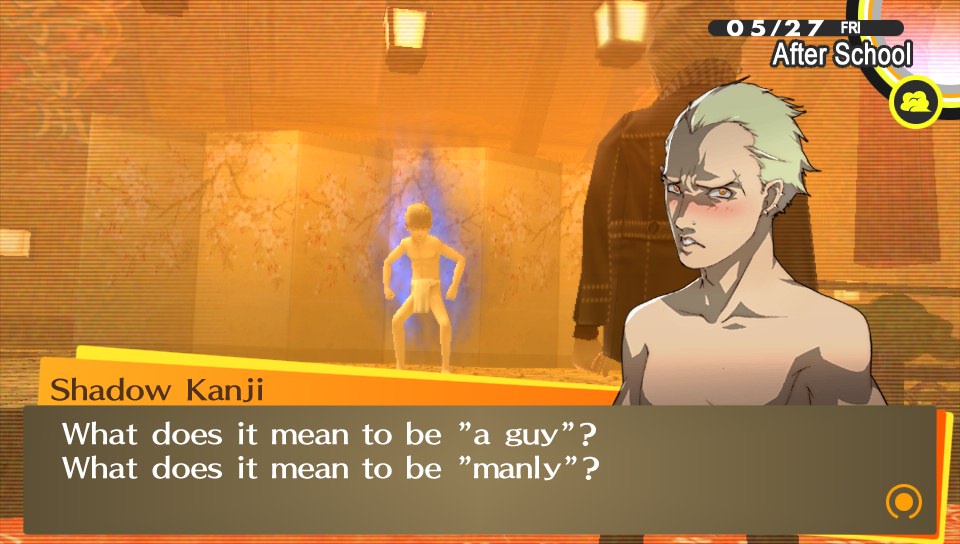Persona franchise

- Developer: Atlus Arc System Works
- Publisher: Atlus ASCII Corporation Deep Silver Koei Ghostlight Sega Square Enix NIS America Zen United
- Year: 1996 – 2015
- Genre: RPG
- Platform/s: Various
The Persona series is filled with a lot of positive and negatives in terms of representation. In the Queer Representation (2016) survey, respondents praised Persona's relationship management systems for their complexity, in that you need to take into account the feelings of the people you are dating, see them regularly, build relationships by dedicating your limited free time to specific people, and share experiences over months. Compared to typical relationship management systems that rely on gift-giving mechanics, respondents enjoyed these elements. However, relationship options in the Persona series are typically heteronormative.
Others also commented on the representation of Naoto. One respondent appreciated that in Persona Q: Shadow of the Labyrinth, Naoto is referred to as a woman by other characters without any fuss, even though she presents masculinely. Other respondents discussed Naoto's representation as not necessarily positive, but interesting for its 'treatment of gender identity and trans issues'. Most of the joy in relation to this representation came from respondents being pleased to see any representation, but not from the accuracy or positivity of the representation itself. One trans man who responded to the survey dislikes the representation of Naoto in Shin Megami Tensei: Persona 4, feeling that the character was offensively written.
Other issues with representation come from Persona 4's representation of Kanji, who is set up to be a gay man who deals with issues of toxic masculinity and homophobic bullying. Respondents were disappointed that Kanji's ongoing questioning of his sexuality and masculinity led to a result of him realising that he was straight all along, particularly when in the Japanese version of the game seems to remain more ambiguous in terms of this. Samantha Xu discusses the issues with Kanji's representation further.
Although some respondents like the way characters in the Persona series have typically defied gender roles, others highlight that breaking gender roles is often ridiculed or mocked.
One respondent mentioned Persona 4: New Days (a fan-made spin-off), praising the way it handles relationships and the way they develop as an improvement on the canonical Persona series.
It is also worth noting that in Persona 2: Innocent Sin, the party corners Tatsuya and asks him who he's in love with; he is given the option of choosing any of the four members of the party, including Jun (a man).
Shin Megami Tensei: Persona 3 Portable allows the player-character to choose either Theodore or Elizabeth as their Velvet Room guide; Elizabeth will flirt with the player-character regardless of their gender, though a scene where she 'spends a long time' with the player-character is removed with they are a woman. Also in this title, Aigis is protective of the player-character regardless of their gender, and their social link text remains the same. Unfortunately, voice acting is removed beyond rank 10 in the route for women; however, in text she does still ask the player-character to touch her 'Papillion Heart' (an intimate gesture comparable to intercourse), she may be considered queer.
Similar uncertainty and controversy surrounded Persona 5 after its release. As discussed on Polygon, Joker can be in a relationship with every woman in the party, as well as every female non-player confidant in the game, but men are non-romanceable. It's implied that one of the male party members is bisexual, if not gay, referencing that he has no interest in women outside of art, but no relationship options are available. In addition, there are two recurring characters who are coded as gay through effeminate stereotypes and who are used as jokes, freaking out Ryuji by flirting with him.
